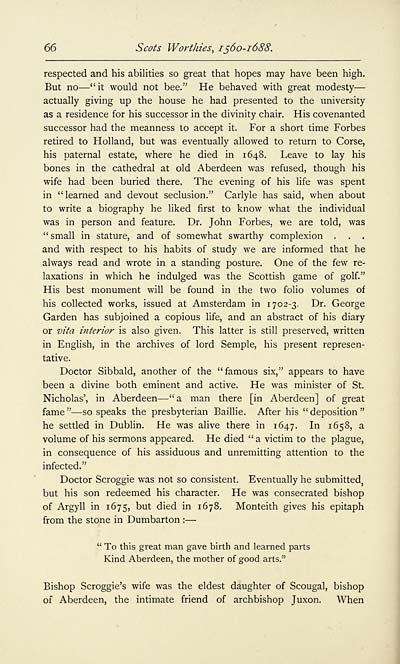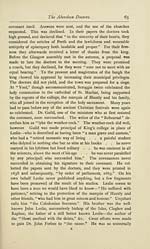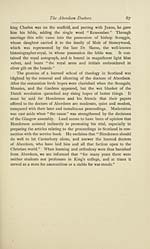Scots worthies, 1560-1688
(86) Page 66
Download files
Complete book:
Individual page:
Thumbnail gallery: Grid view | List view

66 Scots Worthies, 1560-1688.
respected and his abilities so great that hopes may have been high.
But no — "it would not bee." He behaved with great modesty —
actually giving up the house he had presented to the university
as a residence for his successor in the divinity chair. His covenanted
successor had the meanness to accept it. For a short time Forbes
retired to Holland, but was eventually allowed to return to Corse,
his paternal estate, where he died in 1648. Leave to lay his
bones in the cathedral at old Aberdeen was refused, though his
wife had been buried there. The evening of his life was spent
in "learned and devout seclusion." Carlyle has said, when about
to write a biography he liked first to know what the individual
was in person and feature. Dr. John Forbes, we are told, was
" small in stature, and of somewhat swarthy complexion . . .
and with respect to his habits of study we are informed that he
always read and wrote in a standing posture. One of the few re-
laxations in which he indulged was the Scottish game of golf."
His best monument will be found in the two folio volumes of
his collected works, issued at Amsterdam in 1702-3, Dr. George
Garden has subjoined a copious life, and an abstract of his diary
or vita interior is also given. This latter is still preserved, written
in English, in the archives of lord Semple, his present represen-
tative.
Doctor Sibbald, another of the "famous six," appears to have
been a divine both eminent and active. He was minister of St.
Nicholas', in Aberdeen — "a man there [in Aberdeen] of great
fame" — so speaks the presbyterian Baillie. After his "deposition"
he settled in Dublin. He was alive there in 1647. In 1658, a
volume of his sermons appeared. He died " a victim to the plague,
in consequence of his assiduous and unremitting attention to the
infected."
Doctor Scroggie was not so consistent. Eventually he submitted 5
but his son redeemed his character. He was consecrated bishop
of Argyll in 1675, but died in 1678. Monteith gives his epitaph
from the stone in Dumbarton : —
" To this great man gave birth and learned parts
Kind Aberdeen, the mother of good arts."
Bishop Scroggie's wife was the eldest daughter of Scougal, bishop
of Aberdeen, the intimate friend of archbishop Juxon. When
respected and his abilities so great that hopes may have been high.
But no — "it would not bee." He behaved with great modesty —
actually giving up the house he had presented to the university
as a residence for his successor in the divinity chair. His covenanted
successor had the meanness to accept it. For a short time Forbes
retired to Holland, but was eventually allowed to return to Corse,
his paternal estate, where he died in 1648. Leave to lay his
bones in the cathedral at old Aberdeen was refused, though his
wife had been buried there. The evening of his life was spent
in "learned and devout seclusion." Carlyle has said, when about
to write a biography he liked first to know what the individual
was in person and feature. Dr. John Forbes, we are told, was
" small in stature, and of somewhat swarthy complexion . . .
and with respect to his habits of study we are informed that he
always read and wrote in a standing posture. One of the few re-
laxations in which he indulged was the Scottish game of golf."
His best monument will be found in the two folio volumes of
his collected works, issued at Amsterdam in 1702-3, Dr. George
Garden has subjoined a copious life, and an abstract of his diary
or vita interior is also given. This latter is still preserved, written
in English, in the archives of lord Semple, his present represen-
tative.
Doctor Sibbald, another of the "famous six," appears to have
been a divine both eminent and active. He was minister of St.
Nicholas', in Aberdeen — "a man there [in Aberdeen] of great
fame" — so speaks the presbyterian Baillie. After his "deposition"
he settled in Dublin. He was alive there in 1647. In 1658, a
volume of his sermons appeared. He died " a victim to the plague,
in consequence of his assiduous and unremitting attention to the
infected."
Doctor Scroggie was not so consistent. Eventually he submitted 5
but his son redeemed his character. He was consecrated bishop
of Argyll in 1675, but died in 1678. Monteith gives his epitaph
from the stone in Dumbarton : —
" To this great man gave birth and learned parts
Kind Aberdeen, the mother of good arts."
Bishop Scroggie's wife was the eldest daughter of Scougal, bishop
of Aberdeen, the intimate friend of archbishop Juxon. When
Set display mode to:
![]() Universal Viewer |
Universal Viewer | ![]() Mirador |
Large image | Transcription
Mirador |
Large image | Transcription
Images and transcriptions on this page, including medium image downloads, may be used under the Creative Commons Attribution 4.0 International Licence unless otherwise stated. ![]()
| Histories of Scottish families > Scots worthies, 1560-1688 > (86) Page 66 |
|---|
| Permanent URL | https://digital.nls.uk/95152058 |
|---|
| Description | A selection of almost 400 printed items relating to the history of Scottish families, mostly dating from the 19th and early 20th centuries. Includes memoirs, genealogies and clan histories, with a few produced by emigrant families. The earliest family history goes back to AD 916. |
|---|

